外研版必修3 Module 3 The Violence of Nature Grammar课件(39张ppt)
文档属性
| 名称 | 外研版必修3 Module 3 The Violence of Nature Grammar课件(39张ppt) |
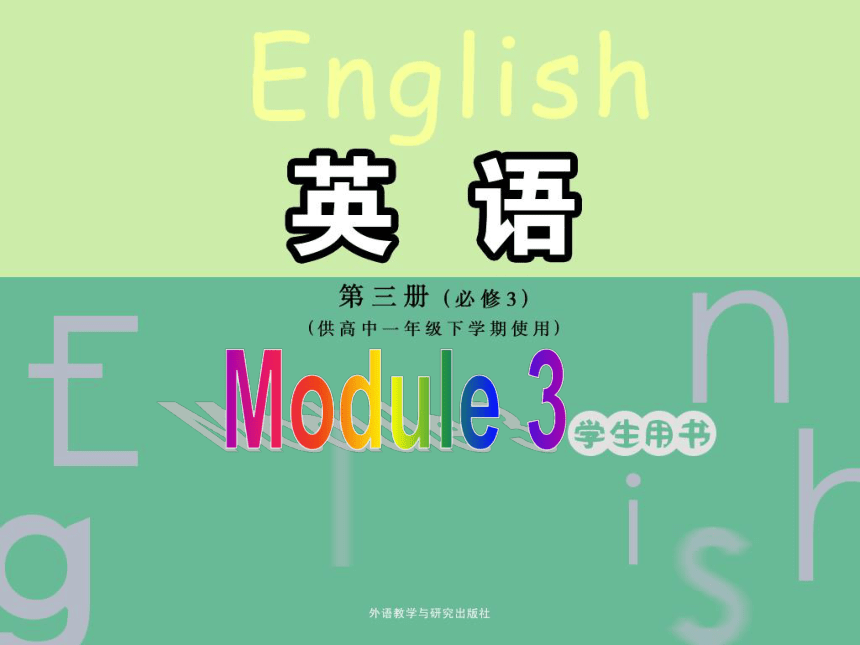
|
|
| 格式 | zip | ||
| 文件大小 | 1.5MB | ||
| 资源类型 | 教案 | ||
| 版本资源 | 外研版 | ||
| 科目 | 英语 | ||
| 更新时间 | 2022-01-28 12:59:44 | ||
图片预览

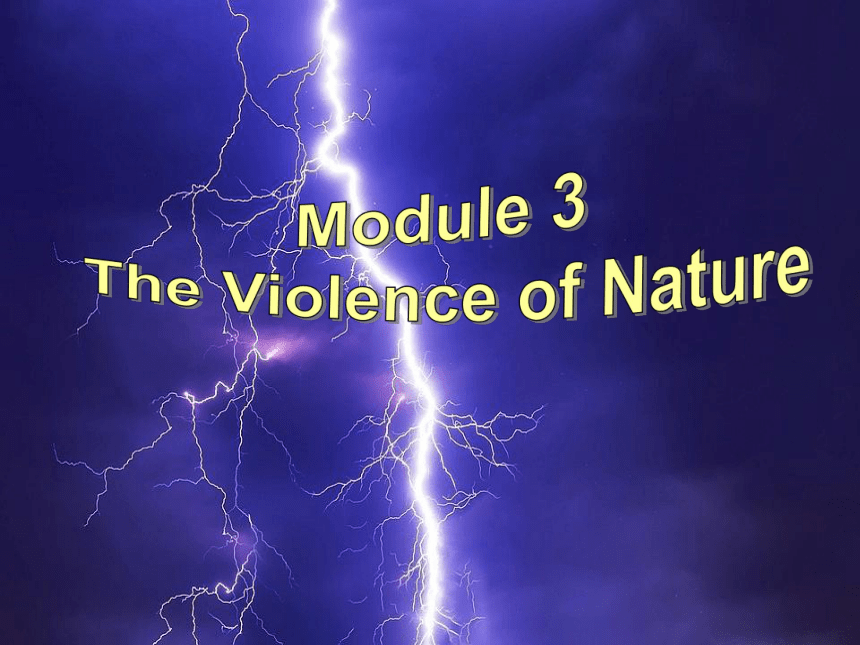
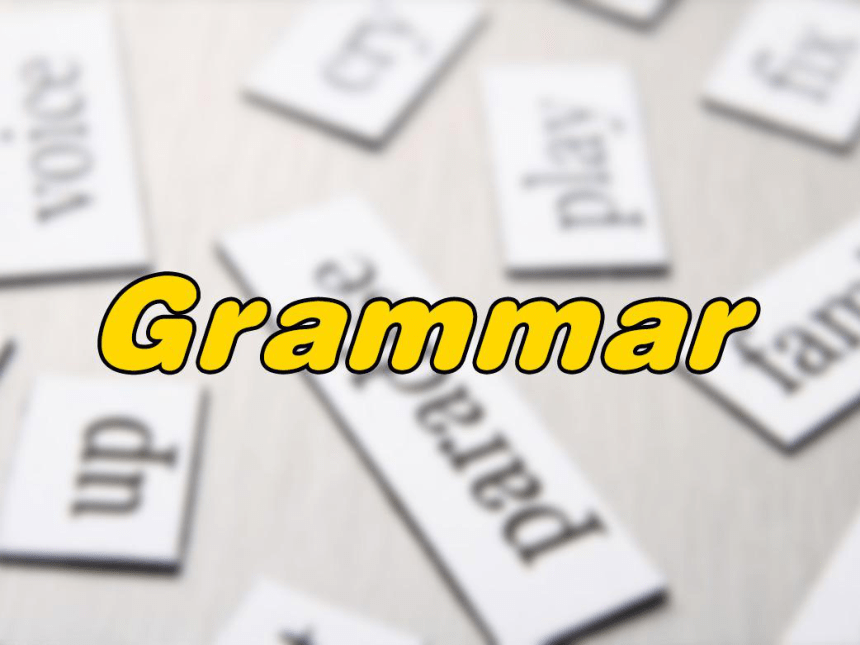
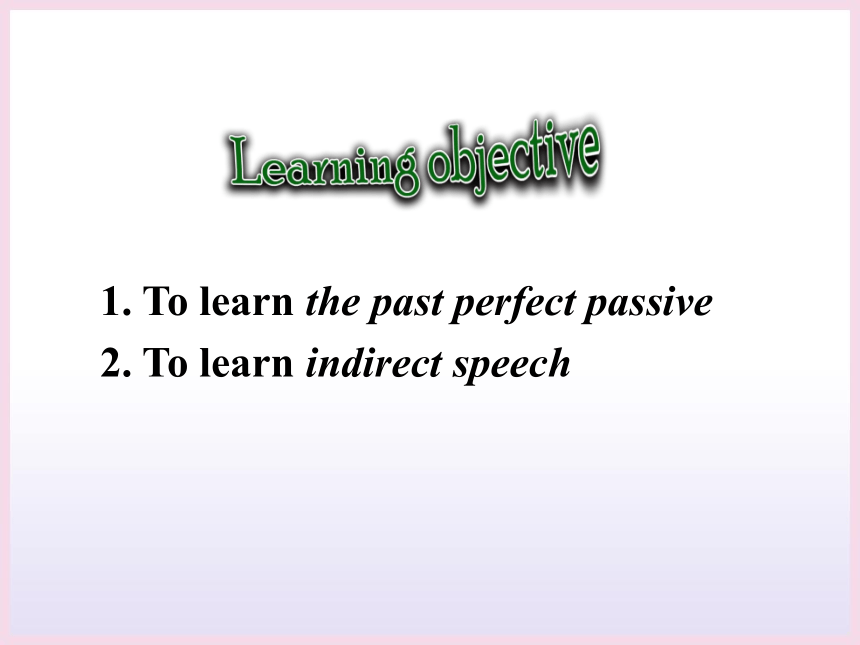
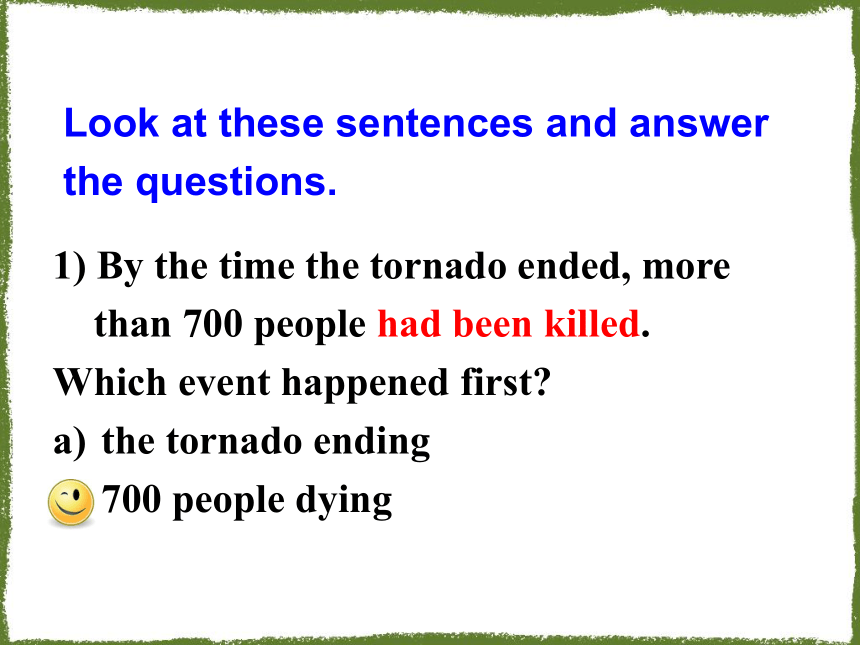
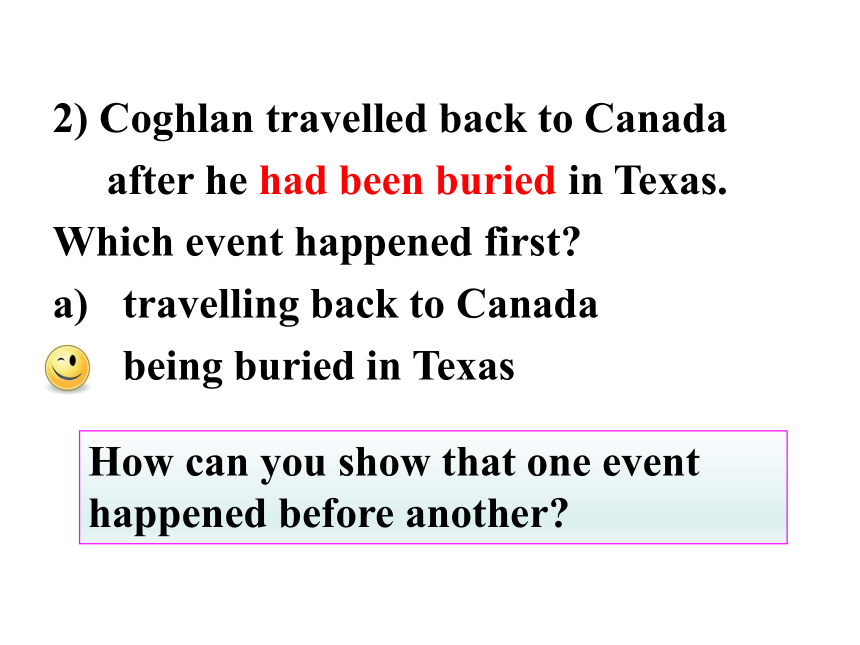
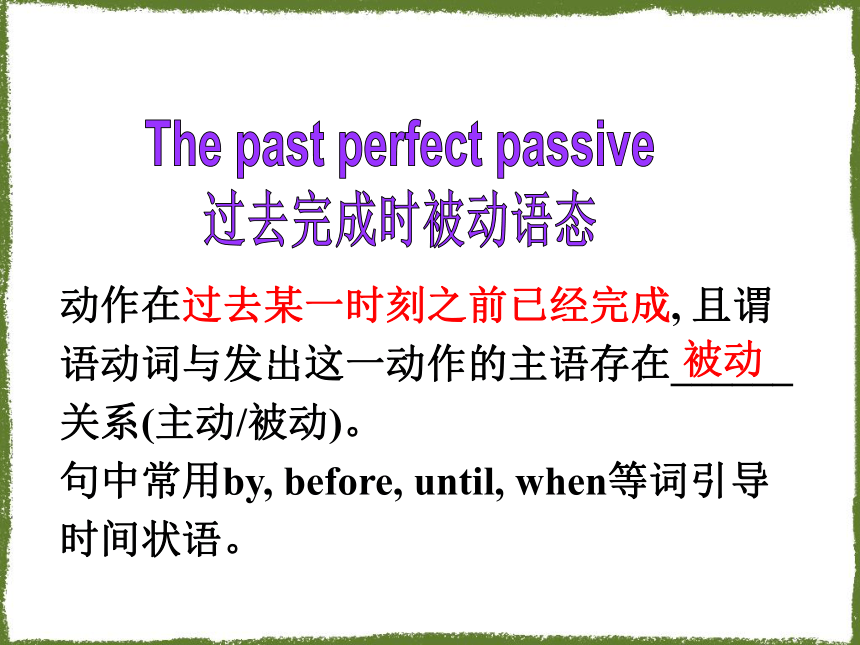
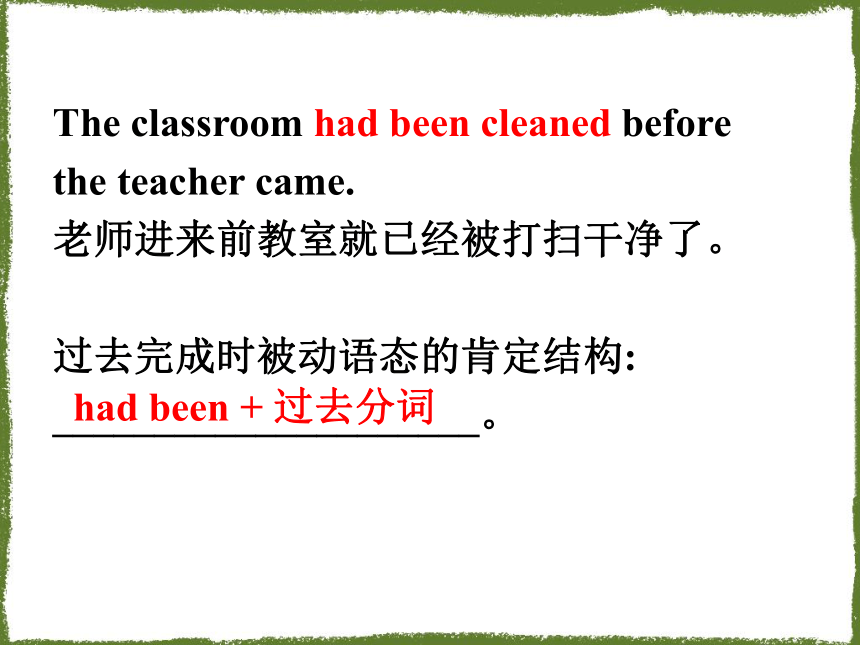
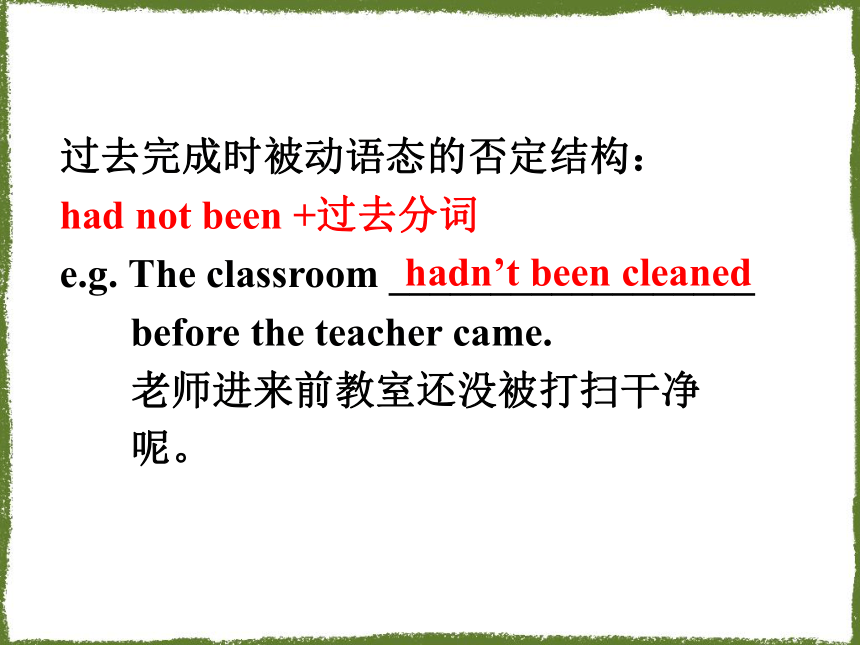
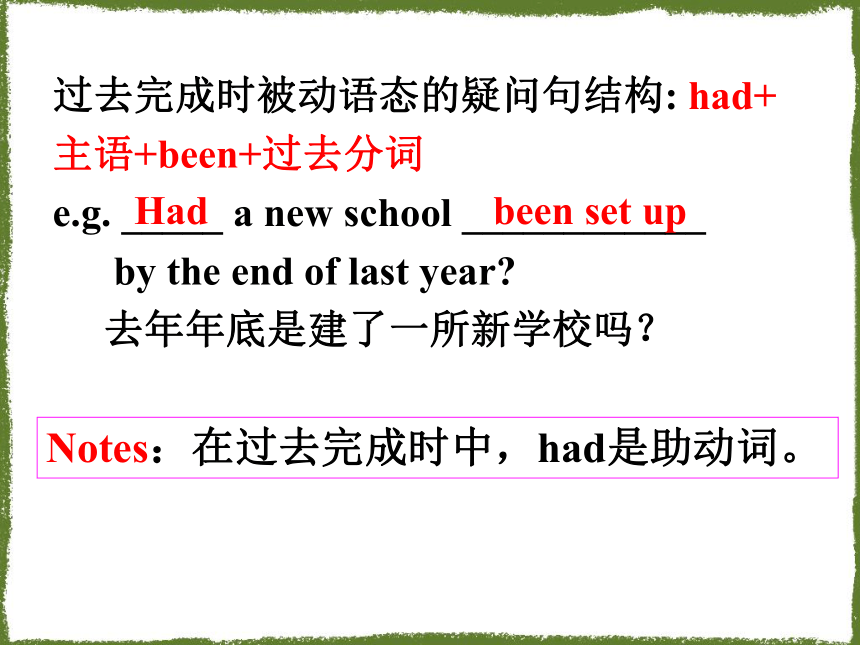
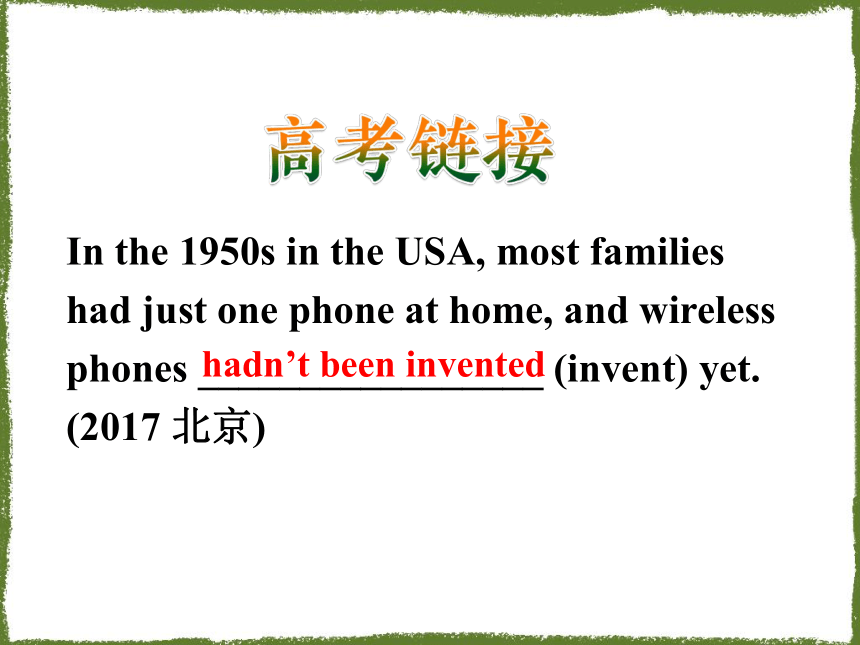
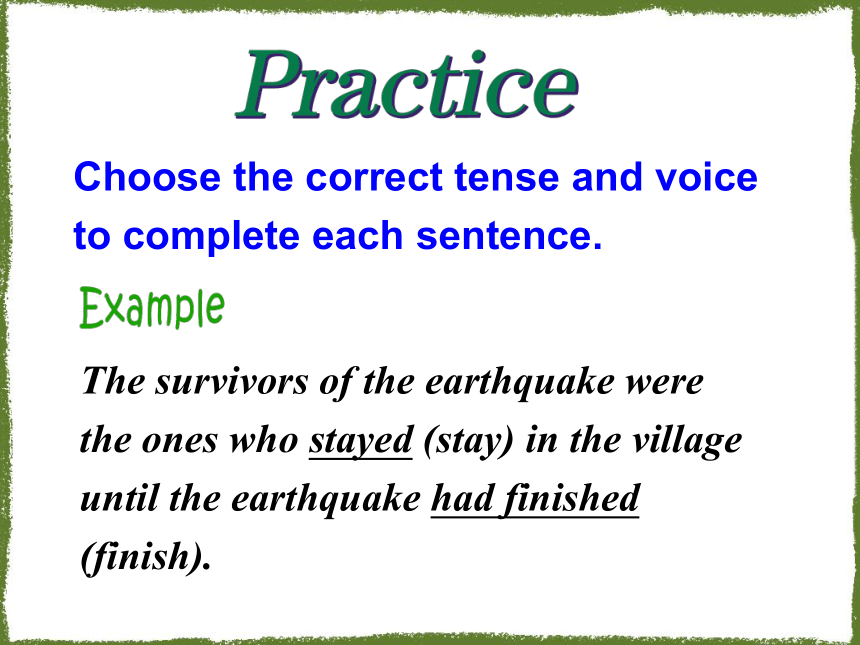
文档简介
(共39张PPT)
Module 3
Module 3
The Violence of Nature
1. To learn the past perfect passive
2. To learn indirect speech
Look at these sentences and answer the questions.
1) By the time the tornado ended, more
than 700 people had been killed.
Which event happened first
the tornado ending
700 people dying
2) Coghlan travelled back to Canada
after he had been buried in Texas.
Which event happened first
travelling back to Canada
being buried in Texas
How can you show that one event happened before another
动作在过去某一时刻之前已经完成, 且谓语动词与发出这一动作的主语存在______关系(主动/被动)。
句中常用by, before, until, when等词引导时间状语。
被动
The past perfect passive
过去完成时被动语态
The classroom had been cleaned before the teacher came.
老师进来前教室就已经被打扫干净了。
过去完成时被动语态的肯定结构:
_____________________。
had been + 过去分词
过去完成时被动语态的否定结构:
had not been +过去分词
e.g. The classroom __________________
before the teacher came.
老师进来前教室还没被打扫干净
呢。
hadn’t been cleaned
过去完成时被动语态的疑问句结构: had+主语+been+过去分词
e.g. _____ a new school ____________
by the end of last year
去年年底是建了一所新学校吗?
Had
been set up
Notes:在过去完成时中,had是助动词。
In the 1950s in the USA, most families had just one phone at home, and wireless phones _________________ (invent) yet. (2017 北京)
hadn’t been invented
Choose the correct tense and voice to complete each sentence.
The survivors of the earthquake were the ones who stayed (stay) in the village until the earthquake had finished (finish).
1. After the hurricane, Mary ___ (see) that the roof of her house ________________ (disappear).
2. She ________ (return) home and ______ (find) all her furniture _______________ (ruin) by the flood.
saw
had disappeared
returned
found
had been ruined
3. Arthur was surprised when he ________ (arrive) home because the tornado _________ (take) the feathers off his chickens.
arrived
had taken
4. We _____ (leave) the house when the thunderstorm ___________ (finish).
left
had finished
5. He _____ (try) to drive back to his home before the flood ______ (pass) through the village.
tried
passed
Complete these sentences with the verbs from the box. Use the past perfect passive, if necessary.
destroy die fall flood kill
1. After the earthquake, they discovered
that several people
_______________________.
had been killed / had died
2. When the hurricane ended, several
buildings in the town ___________
_____________________________.
3. His village _____________________
_____________ in the heavy rain, so
he moved to his parents’ house.
had been destroyed / had fallen down
had been flooded / had been destroyed
destroy die fall flood kill
4. When she woke up, she found that her house __________________ by the thunderstorm.
5. Arthur was unhappy because some of his animals ______________________.
had been destroyed
had died / had been killed
destroy die fall flood kill
直接引语: 直接引用别人的话, 把它放在引号内。(direct speech)
间接引语: 用自己的话转述别人的话。
(indirect speech)
直接引语和间接引语
1. a. David said, “I want to buy the jacket in this shop.”
→David said (that) he wanted to buy the jacket in that shop.
b. “The students are taking a listening test now,” the teacher said.
→The teacher said (that) the students were taking a listening test then.
观察句子,试着归纳直接引语变间接引语的规律。
c. Helen said, “I’ve returned from Paris.”
→Helen said (that) she had returned from Paris.
d. “I had just moved here a week before,” she said.
→She said (that) she had just moved there a week before.
直接引语是陈述句,变为间接引语时,在多数情况下都构成一个由that引导的宾语从句(that在口语中常省略)。
2. a. Tom said, “Can you type, Mary ”
→Tom asked Mary if / whether she could type.
b. “Do you think a diary can become your friend ” the writer says to us.
→The writer asks us if / whether we think a diary can become our
friend.
直接引语是一般疑问句,变为间接引语时,常将它变成由_________引导的宾语从句。
if/whether
a. Tom said, “Can you type, Mary ”
→Tom asked Mary if / whether she could type.
b. “Do you think a diary can become your friend ” the writer says to us.
→The writer asks us if / whether we think a diary can become our
friend.
主句谓语动词是say或said时,
要改为_____或______。
ask asked
3. a. “When will the manager come back from Paris ” she asked me.
→She asked me when the manager would come back from Paris.
b. “Who told you about the job ” Mr. Smith asked me.
→Mr. Smith asked me who had told me about the job.
直接引语是特殊疑问句,变为间接引语时,将它变成由原来的疑问词引导的宾语从句。
4. a. He said to Ann, “Tell me your problem.”
→He told Ann to tell him her problem.
b. David said to me, “Leave the room quietly.”
→David ordered me to leave the room quietly.
直接引语是祈使句,变为间接引语时,通常采用“宾语+不定式”结构。
c. “Don’t work in bed, Tom,” she said.
→She told Tom not to work in bed.
如果转述的祈使句为否定式,则在不定式前加not。
直接引语转化间接引语注意事项
1. 引导词的选用:
直接引语 间接引语引导词
陈述句 that (可省略)
一般疑问句 if / whether
特殊疑问句 wh- / how
2. 直接引语变为间接引语时, 如主句的谓语
动词是一般过去时,从句的谓语动词在时
态方面需要做相应的变化。
直接引语 间接引语
一般现在时 一般过去时
现在进行时 ___________
现在完成时 过去完成时
一般将来时 过去将来时
一般过去时 ___________
过去完成时 过去完成时
过去进行时
过去完成时
直接引语如果是客观真理,变为间接引语时,时态不变。
“The moon travels round the earth once a month,” the teacher said to the children.
→The teacher told the children (that)
the moon travels round the earth once a month.
【温馨提示】
当直接引语中有表示过去的具体的时间状语时, 变为间接引语时, 从句中的谓语时态可以不变。
She said, “I was born in 1995.” →
She said (that) she was born in 1995.
如果在当地或者当天转述, 时间状语、地点状语、动词需不需要发生变化, 这要由当时的语境来确定。
3. 直接引语变为间接引语时人称、指
示代词、时间状语、地点状语和动
词直接引语变为间接引语时,人称、
指示代词、时间状语、地点状语等要
作相应的变化。
直接引语中的第二人称在变成间接引语时,要和原句中的宾语保持一致;
直接引语中的第三人称在变成间接引语时,保持不变。
人称的变化:
遵循一主、二宾、三不变的原则。
即: 直接引语中的第一人称在变成间接引语时, 要和原句中的主语保持一致;
变化项目 直接引语 间接引语
指示代词 this
these
时间状语 now
today, tonight
this week/month…
that
those
then
that day, that night
that week / month …
指示代词/时间状语/地点状语等的变化
yesterday
ten days /weeks…ago
tomorrow/next year..
地点状语 here
方向性 动词 come
bring
the day before
ten days … before
the next day/year…
there
go
take
I. 选用括号内合适的内容补全下面句子。
By the time he got to the school, the first
period ______________ (is finished / had
finished).
2. The media reported more than 1,000 people
________________ (had killed / had been
killed) in the earthquake.
3. The vegetables didn't taste very good. They
________________ (had been cooked / has
been cooked) for too long.
had finished
had been killed
had been cooked
II. 根据示例,用括号内的词转述下面句子。
Example:
Anna to Janet: Don't forget to sign the form.
(remind)
Anna reminded Janet to sign the form.
1. Jack: I'll do my homework after class. (say)
_______________________________________
_______________________________________
Jack said (that) he would do his homework after class.
2. John: Tom, were you playing football at this
time yesterday (ask)
_______________________________________
_______________________________________
3. Kate: What is your favourite book, Joe (ask)
_______________________________________
_______________________________________
John asked Tom if / whether he was playing football at that time the day before.
Kate asked Joe what his favourite book was.
4. Sally: Let's go to see the film. (suggest)
_______________________________________
_______________________________________
5. Peter: Come to my house at 8:30 tomorrow,
Neil. (tell)
_______________________________________
_______________________________________
6. The teacher: Light travels faster than sound.
(say)
_______________________________________
_______________________________________
Sally suggested going to see the film. / Sally suggested that they (should) go to see the film.
Peter told Neil to go to his house at 8:30 the next day.
The teacher said (that) light travels faster than sound.
1. Rewrite the sentences on Page 26.
2. Finish the exercises in the
workbook.
Module 3
Module 3
The Violence of Nature
1. To learn the past perfect passive
2. To learn indirect speech
Look at these sentences and answer the questions.
1) By the time the tornado ended, more
than 700 people had been killed.
Which event happened first
the tornado ending
700 people dying
2) Coghlan travelled back to Canada
after he had been buried in Texas.
Which event happened first
travelling back to Canada
being buried in Texas
How can you show that one event happened before another
动作在过去某一时刻之前已经完成, 且谓语动词与发出这一动作的主语存在______关系(主动/被动)。
句中常用by, before, until, when等词引导时间状语。
被动
The past perfect passive
过去完成时被动语态
The classroom had been cleaned before the teacher came.
老师进来前教室就已经被打扫干净了。
过去完成时被动语态的肯定结构:
_____________________。
had been + 过去分词
过去完成时被动语态的否定结构:
had not been +过去分词
e.g. The classroom __________________
before the teacher came.
老师进来前教室还没被打扫干净
呢。
hadn’t been cleaned
过去完成时被动语态的疑问句结构: had+主语+been+过去分词
e.g. _____ a new school ____________
by the end of last year
去年年底是建了一所新学校吗?
Had
been set up
Notes:在过去完成时中,had是助动词。
In the 1950s in the USA, most families had just one phone at home, and wireless phones _________________ (invent) yet. (2017 北京)
hadn’t been invented
Choose the correct tense and voice to complete each sentence.
The survivors of the earthquake were the ones who stayed (stay) in the village until the earthquake had finished (finish).
1. After the hurricane, Mary ___ (see) that the roof of her house ________________ (disappear).
2. She ________ (return) home and ______ (find) all her furniture _______________ (ruin) by the flood.
saw
had disappeared
returned
found
had been ruined
3. Arthur was surprised when he ________ (arrive) home because the tornado _________ (take) the feathers off his chickens.
arrived
had taken
4. We _____ (leave) the house when the thunderstorm ___________ (finish).
left
had finished
5. He _____ (try) to drive back to his home before the flood ______ (pass) through the village.
tried
passed
Complete these sentences with the verbs from the box. Use the past perfect passive, if necessary.
destroy die fall flood kill
1. After the earthquake, they discovered
that several people
_______________________.
had been killed / had died
2. When the hurricane ended, several
buildings in the town ___________
_____________________________.
3. His village _____________________
_____________ in the heavy rain, so
he moved to his parents’ house.
had been destroyed / had fallen down
had been flooded / had been destroyed
destroy die fall flood kill
4. When she woke up, she found that her house __________________ by the thunderstorm.
5. Arthur was unhappy because some of his animals ______________________.
had been destroyed
had died / had been killed
destroy die fall flood kill
直接引语: 直接引用别人的话, 把它放在引号内。(direct speech)
间接引语: 用自己的话转述别人的话。
(indirect speech)
直接引语和间接引语
1. a. David said, “I want to buy the jacket in this shop.”
→David said (that) he wanted to buy the jacket in that shop.
b. “The students are taking a listening test now,” the teacher said.
→The teacher said (that) the students were taking a listening test then.
观察句子,试着归纳直接引语变间接引语的规律。
c. Helen said, “I’ve returned from Paris.”
→Helen said (that) she had returned from Paris.
d. “I had just moved here a week before,” she said.
→She said (that) she had just moved there a week before.
直接引语是陈述句,变为间接引语时,在多数情况下都构成一个由that引导的宾语从句(that在口语中常省略)。
2. a. Tom said, “Can you type, Mary ”
→Tom asked Mary if / whether she could type.
b. “Do you think a diary can become your friend ” the writer says to us.
→The writer asks us if / whether we think a diary can become our
friend.
直接引语是一般疑问句,变为间接引语时,常将它变成由_________引导的宾语从句。
if/whether
a. Tom said, “Can you type, Mary ”
→Tom asked Mary if / whether she could type.
b. “Do you think a diary can become your friend ” the writer says to us.
→The writer asks us if / whether we think a diary can become our
friend.
主句谓语动词是say或said时,
要改为_____或______。
ask asked
3. a. “When will the manager come back from Paris ” she asked me.
→She asked me when the manager would come back from Paris.
b. “Who told you about the job ” Mr. Smith asked me.
→Mr. Smith asked me who had told me about the job.
直接引语是特殊疑问句,变为间接引语时,将它变成由原来的疑问词引导的宾语从句。
4. a. He said to Ann, “Tell me your problem.”
→He told Ann to tell him her problem.
b. David said to me, “Leave the room quietly.”
→David ordered me to leave the room quietly.
直接引语是祈使句,变为间接引语时,通常采用“宾语+不定式”结构。
c. “Don’t work in bed, Tom,” she said.
→She told Tom not to work in bed.
如果转述的祈使句为否定式,则在不定式前加not。
直接引语转化间接引语注意事项
1. 引导词的选用:
直接引语 间接引语引导词
陈述句 that (可省略)
一般疑问句 if / whether
特殊疑问句 wh- / how
2. 直接引语变为间接引语时, 如主句的谓语
动词是一般过去时,从句的谓语动词在时
态方面需要做相应的变化。
直接引语 间接引语
一般现在时 一般过去时
现在进行时 ___________
现在完成时 过去完成时
一般将来时 过去将来时
一般过去时 ___________
过去完成时 过去完成时
过去进行时
过去完成时
直接引语如果是客观真理,变为间接引语时,时态不变。
“The moon travels round the earth once a month,” the teacher said to the children.
→The teacher told the children (that)
the moon travels round the earth once a month.
【温馨提示】
当直接引语中有表示过去的具体的时间状语时, 变为间接引语时, 从句中的谓语时态可以不变。
She said, “I was born in 1995.” →
She said (that) she was born in 1995.
如果在当地或者当天转述, 时间状语、地点状语、动词需不需要发生变化, 这要由当时的语境来确定。
3. 直接引语变为间接引语时人称、指
示代词、时间状语、地点状语和动
词直接引语变为间接引语时,人称、
指示代词、时间状语、地点状语等要
作相应的变化。
直接引语中的第二人称在变成间接引语时,要和原句中的宾语保持一致;
直接引语中的第三人称在变成间接引语时,保持不变。
人称的变化:
遵循一主、二宾、三不变的原则。
即: 直接引语中的第一人称在变成间接引语时, 要和原句中的主语保持一致;
变化项目 直接引语 间接引语
指示代词 this
these
时间状语 now
today, tonight
this week/month…
that
those
then
that day, that night
that week / month …
指示代词/时间状语/地点状语等的变化
yesterday
ten days /weeks…ago
tomorrow/next year..
地点状语 here
方向性 动词 come
bring
the day before
ten days … before
the next day/year…
there
go
take
I. 选用括号内合适的内容补全下面句子。
By the time he got to the school, the first
period ______________ (is finished / had
finished).
2. The media reported more than 1,000 people
________________ (had killed / had been
killed) in the earthquake.
3. The vegetables didn't taste very good. They
________________ (had been cooked / has
been cooked) for too long.
had finished
had been killed
had been cooked
II. 根据示例,用括号内的词转述下面句子。
Example:
Anna to Janet: Don't forget to sign the form.
(remind)
Anna reminded Janet to sign the form.
1. Jack: I'll do my homework after class. (say)
_______________________________________
_______________________________________
Jack said (that) he would do his homework after class.
2. John: Tom, were you playing football at this
time yesterday (ask)
_______________________________________
_______________________________________
3. Kate: What is your favourite book, Joe (ask)
_______________________________________
_______________________________________
John asked Tom if / whether he was playing football at that time the day before.
Kate asked Joe what his favourite book was.
4. Sally: Let's go to see the film. (suggest)
_______________________________________
_______________________________________
5. Peter: Come to my house at 8:30 tomorrow,
Neil. (tell)
_______________________________________
_______________________________________
6. The teacher: Light travels faster than sound.
(say)
_______________________________________
_______________________________________
Sally suggested going to see the film. / Sally suggested that they (should) go to see the film.
Peter told Neil to go to his house at 8:30 the next day.
The teacher said (that) light travels faster than sound.
1. Rewrite the sentences on Page 26.
2. Finish the exercises in the
workbook.
